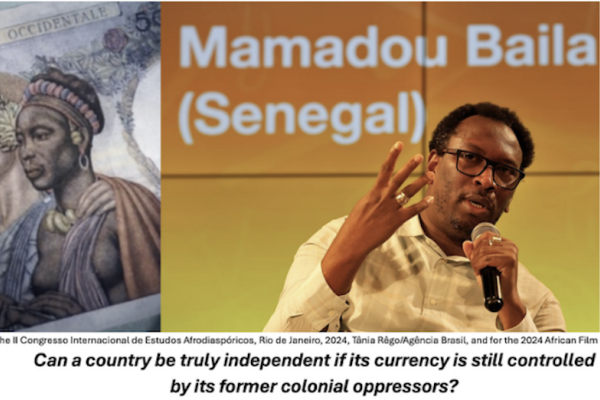
Trânsitos & Transações is an event that is part of the graduate course Black Cinema in the Americas: Women Behind the Camera taught by Prof. Isis Barra Costa. The event will be held in Portuguese.
Luso-Senegalese anti-racist political activist Mamadou Ba will present and discuss his lifelong scholarly and activist experience within the African diaspora. Attendees of his lecture are encouraged to watch Katy Léna N’diaye’s Money, Freedom, a Story of the CFA Franc (Senegal/France/Belgium/Germany, 2022, 104 min.). The documentary is available on the DocuSeek platform and accessible to OSU students, professors, and staff.
Mamadou Baila Ba, from the University of British Columbia, is a Luso-Senegalese translator and an anti-racist political activist who has been the receiver of the Front Line Defenders Award for Human Rights Defenders at Risk. Mamadou is co-author of several public documents on racism and human rights and author of several publications on topics related to immigration, ethnic diversity, and racism. He is one of the most prominent voices of the anti-racist movement in Portugal. Mamadou Ba advocates that the word “Slavery” should always be written with a capital “S” to emphasize that it was a crime against humanity, as well as a genocide. According to him, the Afro-diasporic population managed to create an identity that served to defend this population—a form of “quilombismo” or “maroonage.”
About the documentary: Can a country be truly independent if its currency is still controlled by its former colonial oppressors? In Money, Freedom, a Story of the CFA Franc, director Katy Léna N’diaye traces the history of a currency whose roots lie in compensation for slave owners. Originally used by countries in Central and West Africa, the currency was pegged to the French franc. While France publicly touted the CFA as a benefit to developing nations, it effectively robbed them of the ability to set their own monetary policy. Money, Freedom, a Story of the CFA Franc features rich archival footage and a wealth of interviews with economists, former politicians (including finance ministers and a prime minister), bankers — and even a colonial administrator. They discuss the CFA franc in the context of a colonial system that not only destroyed local governance and economic structures but continues to prevent West African nations from re-imagining an economy that benefits Africans first. Now, the CFA is set to finally be phased, out, replaced by a new currency called the ECO. Will the change be anything more than cosmetic?
